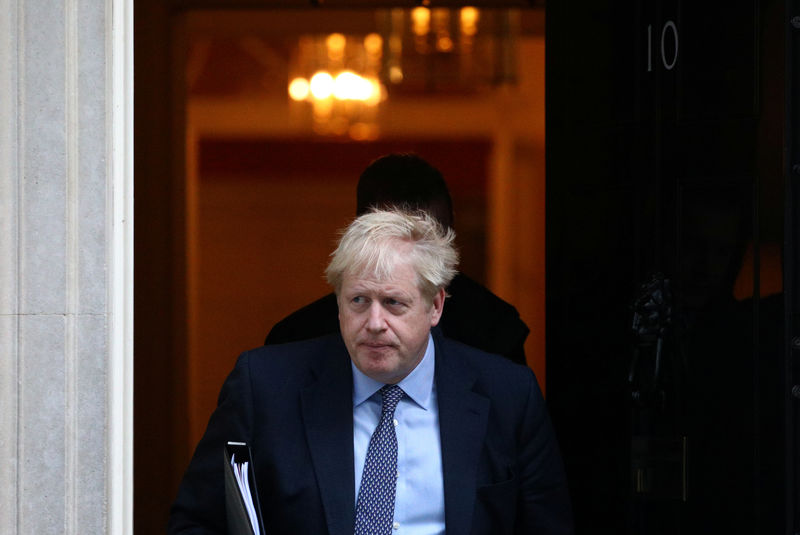By Elizabeth Piper, Kylie MacLellan and William James
LONDON (Reuters) - Prime Minister Boris Johnson will try to drive the legislation needed to take Britain out of the European Union through parliament in the next 10 days, or else break his "do or die" pledge to leave on Oct. 31.
On Monday, Johnson was forced to abandon his attempt to have a straight 'yes or no' vote on his Brexit deal, and is instead trying to speed through the legislation for Britain to leave the EU through the lower and upper houses of parliament.
He still aims to meet his Oct. 31 deadline, despite being forced to send a letter to the EU seeking an extension, a humiliating blow for a leader who said previously he would rather be "dead in a ditch" than ask for a delay.
After more than three years of negotiations, it is unclear as to how, whether or when a deeply divided Britain will leave the bloc, more than 40 years after the country joined the project built out of the ruins left by World War Two.
Following is a rough guide to what could happen next:
BREXIT LEGISLATION
The Withdrawal Agreement Bill is a piece of legislation that implements the terms of the Brexit deal in British law. It has to pass through several stages in each of parliament's two chambers before it becomes law.
TUESDAY: SECOND READING
This provides the first opportunity for lawmakers to debate the principle of the bill.
It is followed by a vote, which the government must win to proceed to the next stage of legislation. This vote is expected at 1800 GMT.
The government believes it has a majority to pass this stage even though the opposition Labour Party and other rival parties are expected to oppose it.
TUESDAY: PROGRAMME MOTION
The government then has to lay out the timetable for the remaining stages of the legislation, and have lawmakers approve this timetable.
This is expected to be a crucial stage, and the vote will take place after 1800 GMT.
Johnson wants to push through the legislation in time for Britain to leave on Oct. 31, but some of those who support the deal in principle are uncomfortable with passing such an important piece of legislation so quickly.
Only a handful of those in favour of the deal would have to object to the timetable for Johnson to lose the slim majority he believes he has behind him.
If parliament does not agree to the timetable, Johnson's plans to leave on Oct. 31 could well be ruined.
BEGINS TUESDAY: COMMITTEE STAGE
At this stage of proceedings, lawmakers discuss proposed changes to the bill.
This is likely to test whether there is a majority in parliament for a second Brexit referendum, or to commit the government to seeking a customs union with the EU in its long term relationship with the bloc.
The government has indicated that negotiations with the EU are closed, so any amendment which is approved by parliament and changes the shape of the deal would be highly problematic.
The government has proposed three hours of debate at this stage on Tuesday, following the programme motion vote, and 12 hours on Wednesday, starting after 1200 GMT.
Discussions on second referendum amendments would take place on Wednesday.
CONCLUDES THURSDAY: REPORT STAGE AND THIRD READING
If the bill survives the earlier stages intact, parliament will have another chance to debate it and make changes, before it is put to a final vote and handed off to the House of Lords.
The government has proposed eight hours of debate for Thursday, which is likely to begin after 0930 GMT.
FRIDAY: The House of Lords
The Lords, parliament's upper chamber, will begin scrutinising and amending the bill through several stages and rounds of voting.
This part of the process is not subject to strict timetabling and deadlines are usually agreed between the parties.
It would likely take several days and any changes would then have to be approved by the House of Commons before the law can be finalised.
EU RESPONSE TO DELAY REQUEST
The chairman of European Union leaders, Donald Tusk, said on Saturday he had received the extension request and he would now be consulting with EU capitals on how to react.
After a short meeting on Sunday, diplomats with the bloc said the EU would play for time rather than rush to decide on the delay request.
"We're looking for more clarity towards the end of the week, hoping that by that time we will also see how things develop in London," one senior EU diplomat said.
Leaders of the 27 states that will make up the EU once Britain leaves are unlikely to deny the extension request.
British minister Michael Gove said on Sunday the EU was "waiting to see what parliament does now".
"We'll have an opportunity in the days ahead to consider the legislation that allows us to leave the European Union. If people vote for that legislation ... then we can leave and we can leave in time," he said.
ELECTION?
Both the governing Conservatives and main opposition Labour Party say they want a new election, but Labour leader Jeremy Corbyn has said he will not back any move to hold one until a no-deal Brexit is ruled out.
"An election is inevitable because of the numbers in parliament, because we have got to break the impasse, the timing will be a matter for Jeremy Corbyn ... but it is inevitable that sooner or later this breaks into a general election," Labour's Brexit spokesman Keir Starmer said on Sunday.
